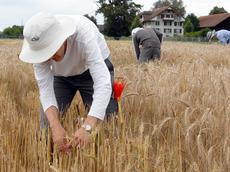Establishment of a new department
ETH Zurich is combining its teaching and research in Health Sciences and Medical Technology into a new department. Agricultural Sciences and Environmental Sciences are also to be merged. This will intensify the research effort into a sustainable food supply, and support the training of the necessary experts.

In order to find answers to some pressing social issues, and also as a result of ever more intense international competition in science, ETH is combining its strengths in order to optimally deploy its resources. There are promising prospects for such structural changes, especially in relation to healthcare with the challenges presented by an ageing society, and environmental problems such as climate change and finding a sustainable global food supply.
This is why ETH Zurich is forming a new Department of 'Health Sciences and Technology', to support collaboration between natural scientists and engineers working in nutrition, movement and neurosciences as well as in medical technology. A key objective will be to ensure that knowledge and technology are transferred into clinical practice. The new department (Health Science and Technology, working name: HEST) will create teaching and research units focusing on important social trends which should attract more potential students. The department is expected to open on 1 January 2012.
Enhancing the status of sustainable agronomy
Resources are also being amalgamated in relation to the environment and natural resources and concentrated in a newly created department of that name. Its exact title has not yet been decided (working name: UWNR). The subjects previously covered by the Department of Agricultural and Food Sciences (AGRL) will be divided up.
The Institute of Plant, Animal and Agrarian Ecosystems Sciences (IPAS), which is in fact the traditional ETH agronomy department, will thus become part of the new UWNR department. With this new positioning, more importance is attached to sustainable agriculture, an essential requirement in securing global food supplies. No professorships will be lost and existing courses will continue, albeit with a new focus.
The recently started 'World Food System' initiative remains of key importance
and will be given more support with, for instance, an inter-departmental
competence centre (the HEST and UWNR departments). Social sciences, which have
crossed departmental boundaries in their organisation for years, will still be united
in the Institute for Environmental Decisions (IED). 'I am convinced
that this restructuring and combining of resources will open up great
opportunities for our researchers and create new synergies', says ETH President Ralph Eichler.
Increased punch and appeal
Because of the subjects
covered by its teaching and research, the Institute of Food, Nutrition and
Health (IFNH),
which is also part of the AGRL department, fits perfectly into the newly
established HEST and will be incorporated into it. With this restructuring, ETH
Zurich will be
able to exert more punch in relevant, issue-focused scientific areas and will
also become even more appealing in the competition for the most talented
students and professors.







READER COMMENTS